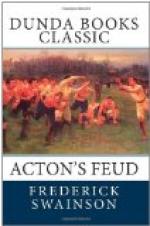THE FOUL
Shannon, the old Blue, had brought down a rattling eleven—two Internationals among them—to give the school the first of its annual “Socker” matches. We have a particular code of football of our own, which the school has played time out of mind; but, ten years ago, the Association game was introduced, despite the murmuring of some of the masters, many of the parents—all old Amorians—and of Moore, the Head, who had yielded to varied pressures, but in his heart thought “Socker” vastly inferior to the old game. Association had flourished exceedingly; so much so that the Head made it a law that, on each Thursday in the Michaelmas term, the old game, and nothing but the old game, should be played, and woe betide any unauthorized “cutters” thereof. This was almost the only rule that Corker never swerved a hair’s breadth from, and bitter were the regrets when Shannon had sent word to Bourne, our captain, that he could bring down a really clinking team to put our eleven through their paces, if the match were played on Thursday. Saturday, on account of big club fixtures, was almost impossible. Corker consented to the eleven playing the upstart code for this occasion only, but for the school generally the old game was to be de rigueur.
So on this Thursday pretty well the whole school was out in the Acres, where the old game was in full swing; and, though I fancy the players to a man would have liked to have lined up on the touch-line in the next field and given Shannon the “whisper” he deserves, O.G. claimed them that afternoon for its own, and they were unwilling martyrs to old Corker’s cast-iron conservatism. Consequently, when Bourne spun the coin and Shannon decided to play with the wind, there would not be more than seventy or eighty on the touch-line. Shannon asked me to referee, so I found a whistle, and the game started.
It was a game in which there seemed to be two or three players who served as motive forces, and the rest were worked through. On one side Shannon at back, Amber the International at half, and Aspinall, the International left-winger, were head and shoulders above the others; on our side, Bourne and Acton dwarfed the rest.
Bourne played back, and Acton was his partner. Bourne I knew well, since he was in the Sixth, and I liked him immensely; but of Acton I knew only a little by repute and nothing personally. He was in the Fifth, but, except in the ordinary way of school life, he did not come much into the circle wherein the Sixth moves. He was brilliantly clever, with that sort of showy brilliance which some fellows possess: in the exams, he would walk clean through a paper, or leave it untouched—no half measures. He was in Biffen’s house and quite the most important fellow in it, and no end popular with his own crowd, for they looked to him to give their house a leg up, both in the schools and in the fields, for




